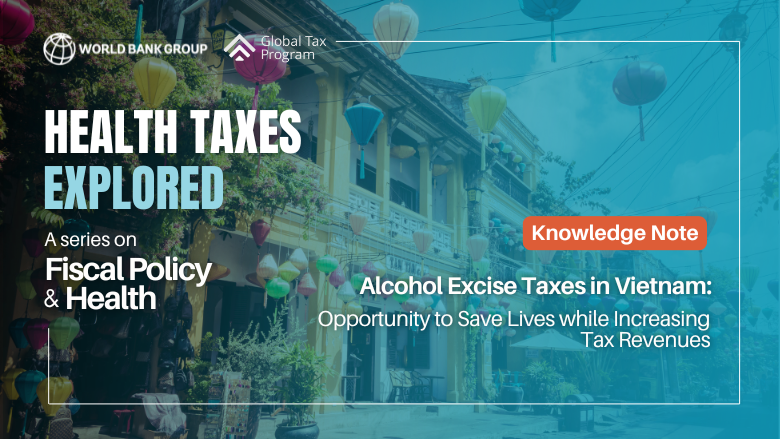The Health Taxes Knowledge Note Series, produced by the Global Tax Program’s workstream on Health Taxes, focuses on crucial considerations to achieve well-designed and effective implementation of excise taxes on tobacco, alcoholic drinks and sugar-sweetened beverages. The purpose of this series is to provide policy makers with an overview of relevant issues and feasible policy choices in setting health taxes based on questions that emerge from the field during health tax reforms.
This first knowledge note in the series, “Why Health Taxes Matter: A Mechanism to Improve Health and Revenue Outcomes” presents an economic framework exploring how health taxes can be used as a mechanism to generate both health and fiscal outcomes. The note also discusses the link between health taxes and tax policy and administration, and actions that countries can take to improve health and revenue outcomes.
The second knowledge note in the series, “Health Taxes and Inflation” explores the interaction between inflation and health taxes and presents a set of good practice policy considerations related to indexation of specific taxes in order to retain revenue potential.
The third knowledge note in the series, "Tobacco Excise Taxes and Tobacco Leaf Farming— Key Considerations" looks at the interaction between tobacco farming and excise taxation across a set of countries that grow tobacco leaf, providing policy makers with an overview of how tobacco excises do or do not impact factors in countries that farm tobacco such as growth, employment and domestic demand.
The fourth knowledge note in the series, "Unpacking the Empirics Behind Health Tax Revenue" gives policy makers an overview of the revenue potential for health taxes, including from policy changes related to adjusting existing tax structures and rates.
The fifth knowledge note in the series, "Sugar-Sweetened Beverage Taxes: Rationale, Evidence and Design for Improving Health" provides an overview of the rationale for implementing sugar-sweetened beverage (SSB) taxes, their impacts, and relevant design and tax administration considerations.
This Q&A provides detailed responses to commonly asked questions about what and how to tax when it comes to nutrition- related targets of excise taxes, including sugar-sweetened beverages, ultra-processed foods, and implications for taxing inputs such as raw sugar or salt. It is a companion to Knowledge Note #5 on Sugar-Sweetened Beverage Taxes: Rationale, Evidence and Design for Improving Health.
The sixth knowledge note in the series, "Saving Lives While Raising Revenue: Opportunities in Brazil’s Reform of Indirect Taxes to Improve Tobacco, Alcohol, and Sugar-Sweetened Beverages (SSBs) Excise Taxes" explores the current situation and policy opportunities to implement well-designed health taxes in the country. The note shows that excise taxes and prices of these products in Brazil are low compared to international peers, and provides detailed recommendations to put in place well-designed excise taxes in the ongoing landmark reform of indirect taxes (PLP 68/2024 and forthcoming Ordinary Law). This Knowledge Note is also available in Portuguese.
📑 Knowledge Note #7: Alcohol Excise Taxes in Vietnam: Opportunity to Save Lives while Increasing Tax Revenues
Despite tax increases, Vietnam has experienced increases in alcohol related mortality and morbidity as a poorly designed ad valorem tax system has not resulted in tax increases leading to higher prices.
The seventh knowledge note in the series, "Alcohol Excise Taxes in Vietnam: Opportunity to Save Lives while Increasing Tax Revenues" analyses the impact of tax increases on beer prices, affordability, sales and tax revenue, and conducts simulations of the impact of tax reforms including implementing specific taxes and tax increases. Results highlight how increasing specific taxes generates a larger impact on alcohol mortality and morbidity and supports ambitious reforms currently under consideration.
📑 Knowledge Note #8: Reforming Health Taxes to Improve Mexico’s Health
Reforming health taxes to improve Mexico’s health. Reforms on health taxes—excise taxes on tobacco, alcoholic beverages and Sugar-Sweetened Beverages (SSBs)—are urgently needed in Mexico to reduce preventable premature deaths. Beyond the health toll in noncommunicable diseases, consumption of these products also carries significant fiscal impacts.
This note reviews the current state of health taxes in Mexico and highlights opportunities to strengthen their design, with the aim of improving population health. The benefits from improving these taxes can be further enhanced through simultaneous progress in other cost-effective interventions. This Knowledge Note is also available in Spanish.
Also see the brief: Reforming Health Taxes to Improve Health in Mexico (Spanish)
Last Updated: Oct 06, 2025





